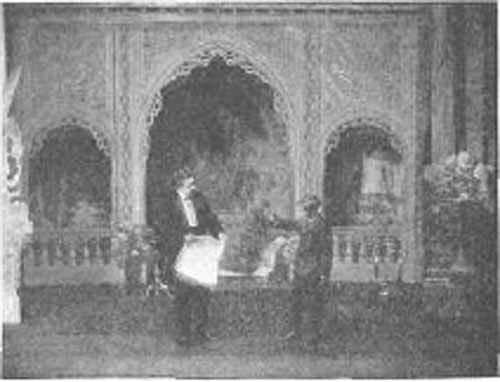Devant and Maskelyne on iDrop (Almost!)
By Andi Gladwin - Tuesday, August 18, 2020
 While Our Magic, may have been first published in 1911, David Devant and Nevil Maskelyne knew a thing about working with onstage participants. In fact, their advice for apparently destroying a borrowed object is as apt today as it has ever been. Here are two extracts from their description of "The Forgotten Guest," which is a trick with a young boy's borrowed watch, which applies as much to modern tricks like iDrop as it does to the trick they described:
While Our Magic, may have been first published in 1911, David Devant and Nevil Maskelyne knew a thing about working with onstage participants. In fact, their advice for apparently destroying a borrowed object is as apt today as it has ever been. Here are two extracts from their description of "The Forgotten Guest," which is a trick with a young boy's borrowed watch, which applies as much to modern tricks like iDrop as it does to the trick they described:
Comedy in conjuring usually depends on the apparent destruction or loss of some confiding person’s property, and in this class of magic an assistant from the audience is generally deputed to take charge of the borrowed article. A great deal of laughter is caused when this innocent gentleman is made to appear to lose valuable jewellery or unwittingly destroy things. In this and the following chapter we propose to give examples of this kind of work, which is always popular, especially with juveniles.
Great tact is required by the conjurer who asks anyone to assist him. The conjurer must always remember that the volunteer helper is rendering a service, and that it would be very bad taste on the conjurer’s part to repay this favour by making the stranger feel uncomfortable or attempting to score off him in any way whatever. The audience expects to be entertained by the conjurer, not by jokes at the expense of individuals amongst them. On the other hand there is nothing they like better if they feel that the individual is a willing victim or, if the performer can so arrange the affair that no one is offended at the finish.
To accomplish this the wizard will be wise to treat the good-natured man who usually responds to an invitation to step up and hold something, not as an inferior and ignorant person, but as a good friend who is worthy of all consideration. No man cares to look a fool, but only a foolish person will refuse to take his part in a joke when once he has taken the first step and, when he understands that he is playing part of the game he will rather enjoy it.
An experienced conjurer will not call upon a volunteer assistant without first obtaining his consent to help. After that he will take him into his confidence. A whispered word at the right moment will give the visitor a feeling of importance, especially if the conjurer conveys the idea that the success of the evening depends upon his kind assistance.
Manners make or mar any entertainer who gets into personal touch with an audience, and if our magician lacks the right manner for managing people he had better leave this particular sort of work alone and make up his programme with problems that do not require the assistance of the spectators, for alas, we cannot give him the secret of it.
Back to blog homepage
Similar posts on the blog:

